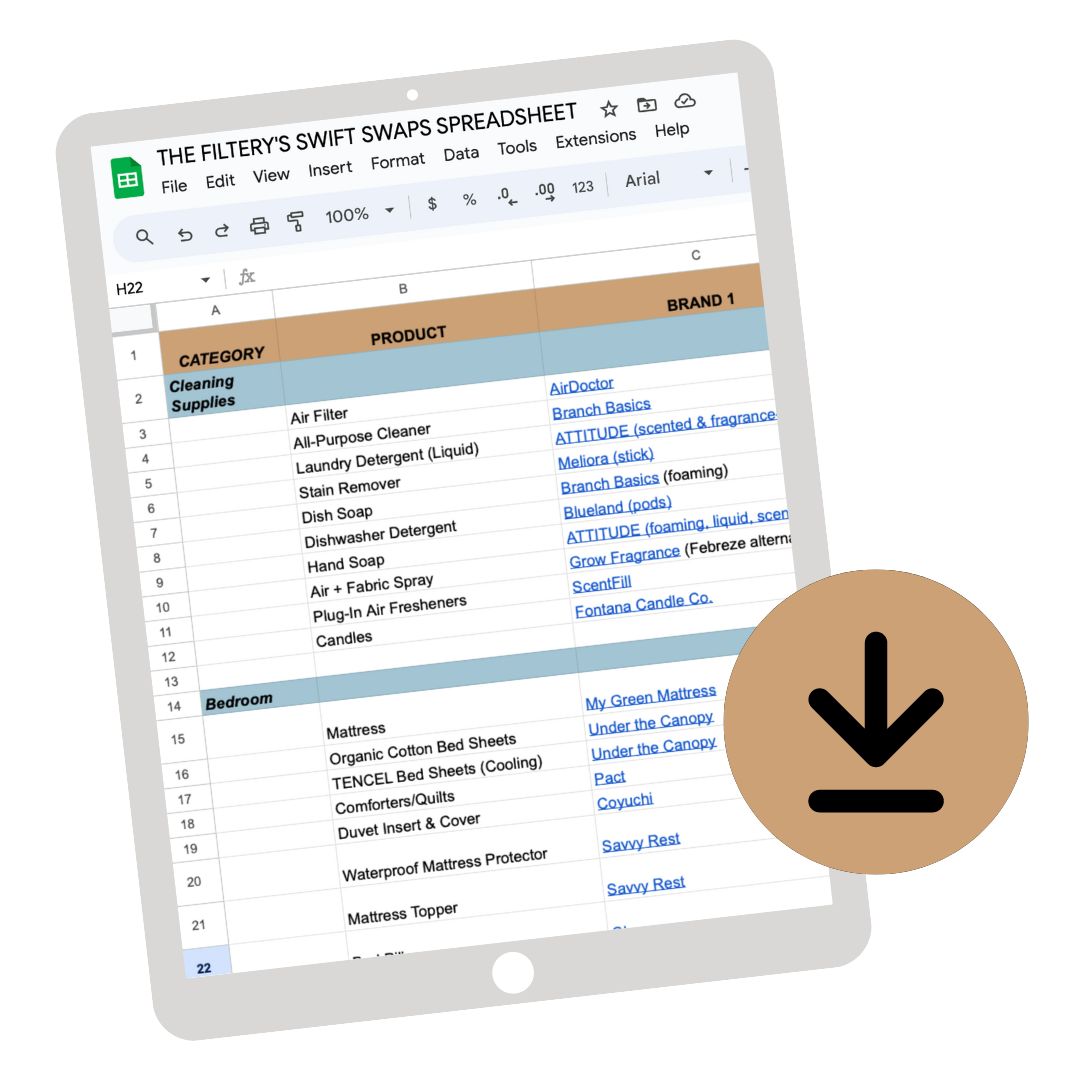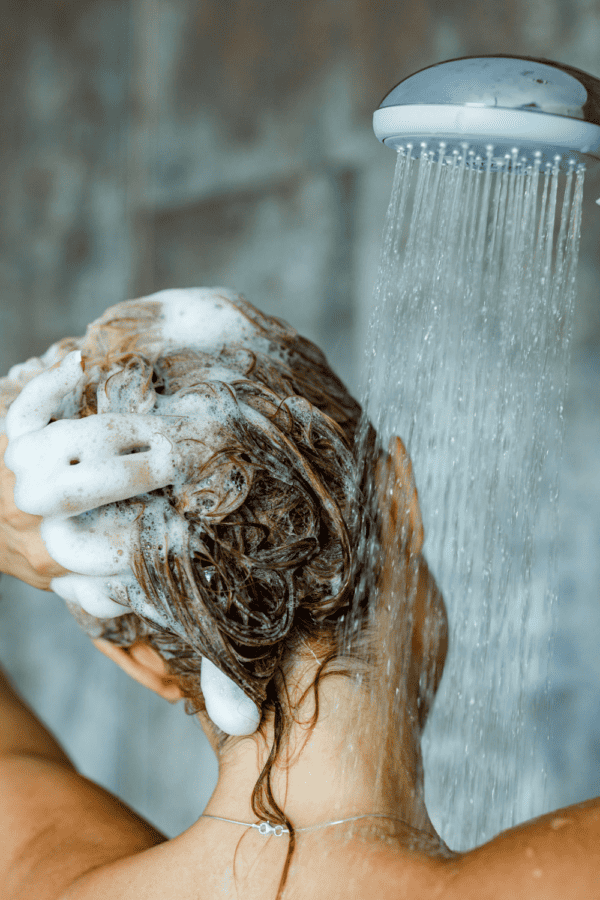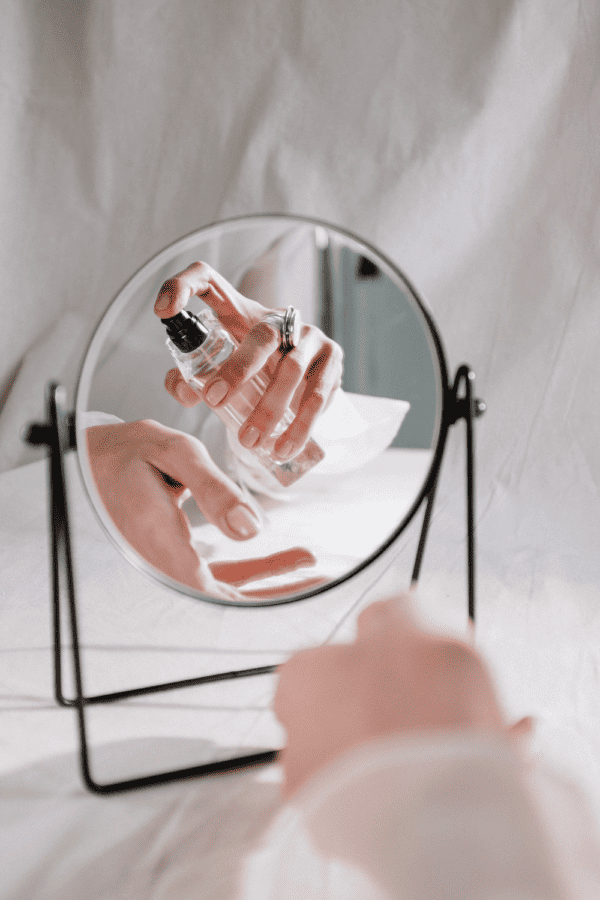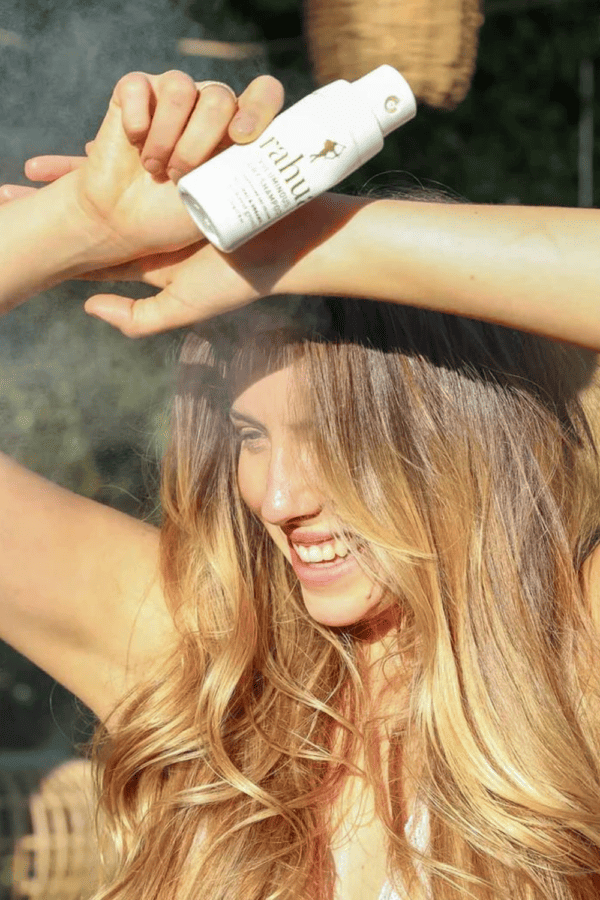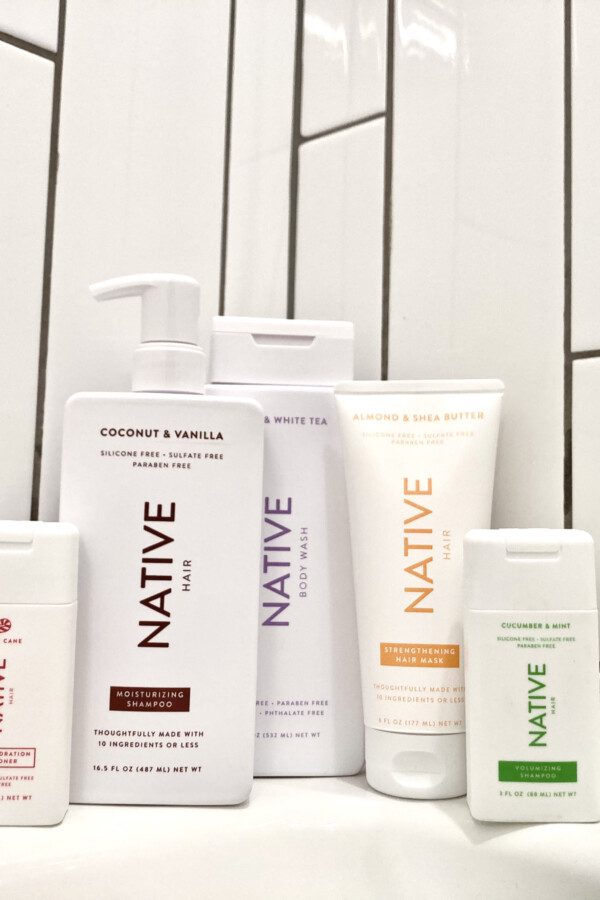Written by Beth Waweru and Abbie Davidson
As a new parent, you probably don’t want to put any harsh chemicals on your little one’s skin. You’re trying to prevent skin irritation while also avoiding things like endocrine disruptors.
We’re here to help.
In this guide, we’re giving you our recommendations for the best sensitive skin baby wipes that are free from things like phthalates, parabens, chlorine, formaldehyde releasers, and skin irritants. Plus, you’ll learn about what to look for in the best non-toxic baby wipes so that you know what to look for when shopping other brands as well.
RELATED: Our picks for the best non-toxic baby diapers (disposable and reusable)
Table of Contents
This article contains affiliate links, which means we may earn a commission if you decide to make a purchase.
Why Should You Use Non-Toxic Baby Wipes?
Think about it.
Who do you use your wipes for and what parts come into contact with the wipes?
There you have your answer. You are using the wipes for the most sensitive parts of your most delicate human. It matters what interacts with their skin.
Dermatologists have advised against harsh ingredients that can have an acute effect on your baby’s skin, causing rashes and irritation. But in addition to that, endocrine disrupting chemicals (EDCs) such as phthalates can have more serious, longterm effects on a growing child. Babies are more vulnerable to the potential negative effects of EDCs in part because they are still growing and developing, so even slight changes to hormone function can have major downstream effects.
With that, let’s look at factors to consider as you shop for your next batch of non-toxic baby wipes.
(Or if you don’t want to learn about the details right now, you can skip right to our recommended brands.)

Factors to Consider when Choosing Non-Toxic Baby Wipes
1. The Cloth Itself
Before we get into the ingredients that are often added to wet wipes, let’s talk about the actual fabric cloth.
Most “conventional” baby wipes are most commonly made out of polyester, polypropylene, or some kind of blend. These are plastic. And while they may not be the worst kinds of plastic, they’re not great either. We’ve talked about the potential problems with polyester here.
It’s not always possible to avoid plastic, but considering that there are alternative options available when it comes to baby wipes, mosts eco-conscious parents will want to avoid wiping their child’s bum with fossil fuel products when they can.
So, what are natural baby wipe brands using instead of plastic?
These days, most non-toxic baby wipes are made from some sort of plant-based cellulose. This can be made from wood pulp, bamboo, eucalyptus, or something similar. These are rayon or viscose fabrics, and are also referred to as “cellulose” wipes or “plant-based” wipes.
The tricky part here is that not all rayon/viscose fabrics are created the same. Some of them are manufactured using toxic chemicals that get dumped into the air and water during processing. We addressed this in-depth right here.
So ideally, you’ll want to look for brands that source their rayon/viscose from a transparent brand that uses closed-loop manufacturing processes, such as Lenzing. So far, is the only wet wipe brand we’ve found that has been transparent about this aspect of sourcing, but we will update this article if/when we find other brands that do too.
BUT, if you can’t figure out what exactly your plant-based baby wipes are made out of, don’t freak out. For one: I would argue that rayon/viscose baby wipes are still better than plastic ones (even if they aren’t perfect). And two: thus far, I haven’t seen any indication that any of the chemicals used in the rayon manufacturing process remain in the final product. So even though rayon manufacturing is a serious problem, it’s one that is mostly further up in the supply chain and doesn’t have as much to do with your baby’s butt.
(Quick side note: FSC certified cloth is not the same thing as closed-loop/non-toxic. FSC certified products indicate that the plant fibers have been sourced in a responsible way, but it doesn’t necessarily mean anything about how those fibers are processed and made into the final product.)
The best option is organic baby wipes that are made from certified organic cotton. As you probably already know, organic cotton is grown and processed without a bunch of toxic pesticides and is therefore healthier for everyone involved.
The major downside to organic cotton cloth is that it’s significantly more expensive than rayon/viscose based wipes. That’s probably why there’s really only one non-toxic baby wipe brand making wet wipes out of organic cotton, and that’s also why we’re including plenty of cellulose-based brands below.
You can also go for dry wipes and/or reusable baby wipes that are made out of organic cotton, which we’ll get to more in a minute.
Bleaching Method
You’ll also want to consider how the wipes are bleached. Many paper/fabric goods are bleached using chlorine, which produces carcinogenic dioxins. We covered this in our guides to better toilet paper and paper towels. While it’s not clear how much chlorine or chlorine byproducts are in the final product, the manufacturing process results in chlorine, dioxins, and furans in our environment, which is not healthy for our air, waterways, or overall ecosystems.
If possible, you’ll want to look for unbleached wipes or wipes that are whitened using a TCF (total chlorine free) method.
2. Ingredients
In addition to the cloth itself, you’ll want to consider what other ingredients are added to the wipes. Ideally, you’ll want to look for a relatively short list of ingredients. The basics needed for baby wipes are water, some sort of cleanser, and a preservative. Many natural baby wipes brands also use extra skin-soothing ingredients such as organic aloe vera and chamomile extract.
Preservatives
Considering that you’re dealing with a wet product, preservatives are super important for preventing mold, mildew, and bacteria. Some preservatives are much better than others, though. You want to avoid things like:
- Parabens, which are endocrine disruptors
- Formaldehyde releasers, such as DMDM hydantoin
- Isothiazolinone preservatives, such as methylisothiazolinone, which are considered skin irritants
- Ethoxylated preservatives, such as polysorbate-20, which can be contaminated with carcinogens because of the manufacturing process.
Instead, you want to look for safer preservatives such as citric acid, sodium benzoate, and potassium sorbate. If you’re not comfortable using products with these preservatives, then you’ll want to skip the wet wipes altogether and use dry wipes with your own water/soap instead.
Fragrance
If possible, you’ll want to avoid “fragrance” as an ingredient in baby wipes. Because of what’s often referred to as the “fragrance loophole,” manufacturers are allowed to include ~4,000 different chemicals in their products under the word “fragrance.” Many of these ingredients are perfectly safe, while others are very problematic.
Phthalates are one of those ingredients that are often added to fragrances in order to make them “stick.” Phthalates are endocrine disruptors and you do not want them on your baby.
You’ll notice that all of our recommended baby wipes are unscented. Some of them do have a very light natural scent due to things like chamomile.
3. Thickness & Texture
Thicker baby wipes are more absorbent and even when dealing with heavy messes, you will need just a few. Ultimately, it will be more cost-effective and less wasteful.
But if you need the wipes for other functions such as wiping your hands or your baby’s face, then thickness may not affect you much.
This often just comes down to preference. You may need to try a few different brands to figure out what you like best.
4. Dispensing Design
Most new parents have had this experience at one point: your baby’s butt is a mess, you go to grab a wipe, and you end up pulling out a quarter of the wipes from the dispenser because they’re all stuck together! You have to figure out how to unstick them with one hand while your baby is squirming and you’re trying not to make an even bigger mess. Then you have to manually stick them back into the container afterward.
Not fun.
So next time you are shopping for non-toxic wipes, ensure the dispensing design allows one-hand handling and easy pull-out. A sturdy and firm dispensing design keeps the wipes well-moisturized to the last one. Again, this might come down to preference and what works for you! (It also may be a lower priority compared to safe ingredients.)
5. Price
If you are a parent on a budget, you may find some non-toxic baby wipes more on the expensive side, while others are closer to the average price of “conventional” baby wipes.
Of course, the cost of skin rashes or exposure to harmful chemicals on your little one is worth it, but if you can’t afford them, try not to be hard on yourself and just do the best you can. Even choosing more “conventional” baby wipes that are fragrance-free is an excellent step in the right direction.
You also may want to save money by using reusable baby wipes instead! We’ve got some pointers on that toward the bottom of this article.
Okay, now let’s get to our picks for the best natural baby wipes!
Our Picks for the Best Non-Toxic & Natural Baby Wipes
Here are our picks for the best non-toxic baby wipes. For most of the brands, I recorded a little video clip for you to give you an idea of how the wipes come out of the container, what the general texture is like, and how stretchy/firm they are.
Eco Pea Co.
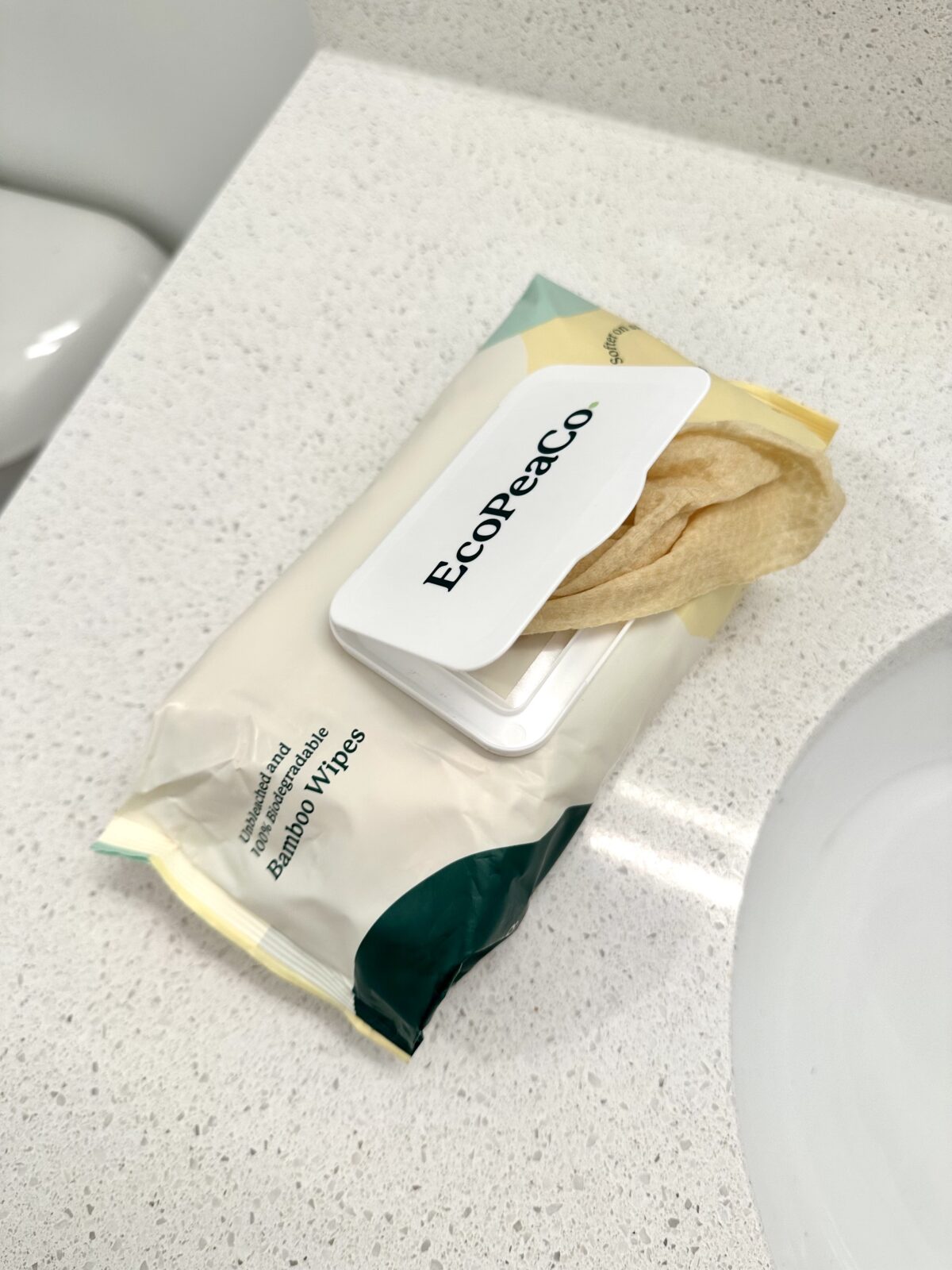
Types of wipes: Just one kind—unbleached bamboo wipes
Price range: $72 – $82
This is one of the very few brands of baby wipes that are unbleached, making them some of the safest baby wipes.
Eco Pea wipes are made out of a plastic-free cellulose fiber, 99% water, and a few other safe ingredients for cleansing and preserving. They are EWG Verified as well as Leaping Bunny Vegan/Cruelty Free.
Eco Pea Co. has got a bunch of other sustainability initiatives as well, like the use of FSC Certified bamboo (for the fabric part of the wipe) and carbon removal shipping.
What we like:
- Unbleached.
- Fragrance-free.
- Good mixture of thickness + softness + texture.
- You can save money by signing up for a subscription.
What we don’t like:
- They only offer larger quantity orders (720 wipes), so it’s a bit more expensive up-front.
Healthybaby

Types of wipes: Wet wipes & dry wipes
Price range: $28 – $57
Healthybaby offers two different kinds of baby wipes:
Their wet wipes are made out of 100% plant-based materials, including FSC Certified wood pulp (rayon) for the fabric. They come with both EWG Verified and MADE SAFE certifications, which means the formulation has been vetted to be free from a long list of harmful chemicals. They include skin-nourishing ingredients like Organic Aloe Vera, Honeysuckle, Chamomile, and Vitamin E.
Their dry wipes are made out of 100% pure organic cotton. They can either be used dry as they come, or you can make your own wet wipes with them by just adding filtered water and/or a cleanser of your choice. This allows you to use even more minimal ingredients and eliminates the need for preservatives.
What we like:
- Unscented with no added fragrances.
- Uses TCF (hydrogen peroxide) bleaching method.
- They get the job done with the right amount of thickness (plus an embossed texture).
- Slightly larger than other wipes so you don’t have to use as many.
- Option to choose between wet or dry wipes, or get both and use them for different purposes.
- You can save money by signing up for a subscription.
- Comes with several third-party certifications.
- You can buy them with their disposable diapers, which is our pick for the best overall brand for non-toxic diapers.
What we don’t like:
- Not readily available at retail stores.
- More expensive compared to some other brands.
ATTITUDE

Types of wipes: Regular and Sensitive Skin baby wipes
Price range: $8 – $32
ATTITUDE offers two main kinds of wet wipes, both of which come in 1, 3, or 6-unit packs.
Both are made of mostly water, combined with plant-based preservatives and skin-soothing ingredients like chamomile. The Sensitive Skin version has added ingredients like oatmeal to help with dry and irritated skin. It’s also got the stamp of approval from the National Eczema Association. They’re both EWG Verified as well.
What we like:
- Hypoallergenic and ideal for sensitive skin.
- Unscented, minimizing potential irritants.
- Can save money by signing up for a subscription.
What we don’t like:
- Not readily available in retail stores.
- Uses ECF bleaching method (chlorine dioxide instead of chlorine bleach)
Pipette

Types of wipes: Just one standard baby wipe
Price range: $5 – $42
Pipette is another great baby product brand that carries not only baby wipes but also baby body washes, lotions, diaper rash cream, and more.
One thing that sets Pipette baby wipes apart from the rest is that they use squalene, which they describe as mimicking “baby’s first built-in moisturizer.” They also put to use other nourishing ingredients like vitamin E and apple extract, and of course they leave out all of the toxic ingredients.
They’re EWG Verified and Leaping Bunny Certified Vegan/Cruelty-Free as well.
What we like:
- Unscented.
- Comes out of the dispenser easily.
- Uses squalene for extra moisturizing powers.
- Can save money by signing up for a subscription.
What we don’t like:
- They don’t sell diapers, so you can’t get your diapers and wipes in the same place.
- Not widely available in retail stores.
- Uses ECF (elemental chlorine free) method for bleaching. (This is better then the ‘normal’ chlorine bleaching process, but it’s not the best method and it’s not 100% free from chlorine.)
Natracare

Types of wipes: Organic baby wipes, organic intimate wipes (for adults), flushable wipes, and makeup remover wipes
Price range: $9 – $125
This is the only brand on this list that uses certified organic cotton for their wet wipes instead of plant-based cellulose! These eco-friendly wipes are pH balanced and include several natural, skin-friendly ingredients like chamomile and calendula.
Natracare baby wipes come with a lot of different third-party certifications, including MADE SAFE, EWG Verified, The Soil Association Organic, and Vegetarian Society Vegan Approved.
What we like:
- The fabric part of the wipe is made out of certified organic cotton.
- Uses TCF bleaching method (hydrogen peroxide).
- You can find them at many large retailers, including Amazon, Kroger, and Whole Foods.
What we don’t like:
- One of the most expensive brands on this list.
- Their ingredient list is a little bit longer than the other brands, which may not be ideal for babies with specific allergies.
- You can’t buy them directly from the brand’s website.
Kudos

Types of wipes: Just one kind of premium wet wipe
Price range: $24 – $48
Kudos got our picks for the most affordable non-toxic diapers, so it’s a great place to get wipes, too. Like most of the other wipes featured here, they use plant-based cellulose fibers, 99% water, and minimal other ingredients.
These ones are EWG Verified as well.
What we like:
- They source their cellulose from Lenzing, which uses less-toxic chemicals for manufacturing and a closed-loop process (so chemicals don’t end up in waterways, etc.)
- Uses either ECF or TCF bleaching method.
- They have a raised quilted pattern that helps you “really get in there.”
- You can save money by bundling with the diapers.
What we don’t like:
- They don’t offer trial packs.
- They’re not available in retail stores.
Eco by Naty

Types of wipes: Unscented, flushable, aloe vera
Price range: $3.99 – $9.99
Naty is another brand that doesn’t bleach their wipes at all. These natural wipes from this Swedish brand are made from ultra-thin, plant-based fibers, resulting in smooth and soft baby wipes that don’t irritate.
Eco by Naty non-toxic baby wipes are an excellent option—even for newborn babies—as they are hypoallergenic, unscented, and free from harsh chemicals and irritants. Instead, they use a simple list of safe cleansers and preservatives.
You can get them in a travel pack (42 wipes), a regular pack (56 wipes), or a triple pack (168 wipes).
What we like:
- Well-moisturized without being too wet.
- Unscented.
- More affordable compared to other non-toxic wipe brands.
- Unbleached.
- Available at several big retailers throughout the U.S., as well as small online retailers such as EarthHero
What we don’t like:
- Poor dispensing of the wipes (several folded together)
- A bit thin compared to other brands
Honest

Types of wipes: CLEAN CONSCIOUS™ wet wipes, dry wipes, sanitizing wipes, makeup removing wipes, and all-purpose wipes
Price range: $0.99 – $45
The Honest Company’s CLEAN CONSCIOUS™ wipes are hypoallergenic and safe for babies with sensitive skin. I love their thickness and sturdy texture and I only need a few, even on messier days. They come with a handful of different third-party labels, including EWG Verified and National Eczema Association.
And of course, just like the rest of the brands recommended here, Honest wipes free from problematic chemicals such as synthetic fragrances.
If you just want to try out the wipes for the first time, you can buy a 10-count pack for just 99 cents. Then you can choose whether you want to save money now or later by choosing between 36, 60, 300, 600, 649, or 720-count packages! Plus, the packaging is available in lots of fun prints, so you can match your nursery or diaper bag.
Their dry wipes are made out of only one ingredient: 100% organic cotton. You can use them dry or add your own water or cleanser to make them into wet wipes.
They have several other wipe options as well (even though you can technically use the CLEAN CONSCIOUS™ ones for a variety of purposes!). Their all-purpose wipes have added ingredients like natural fragrances and are meant to be used for things like messy hands or a post-workout refresh. Their sanitizing wipes are made with alcohol and kill 99% of germs. And of course, their makeup removing wipes are meant for… removing makeup!
As a side note, we did a more comprehensive breakdown of the Honest brand as a whole right here!
What we like:
- Lots of options to choose from—different types of wipes, packaging patterns, and wipe-count.
- You can save money by signing up for a subscription.
- Perfect thickness, so you don’t need to use a lot for moderate to heavy messes.
- Baby wipes are fragrance-free.
- Uses TCF method for bleaching (hydrogen peroxide).
- Available at many big box retail stores such as Target.
What we don’t like:
- Does contain some synthetic ingredients.
Kinder by Nature
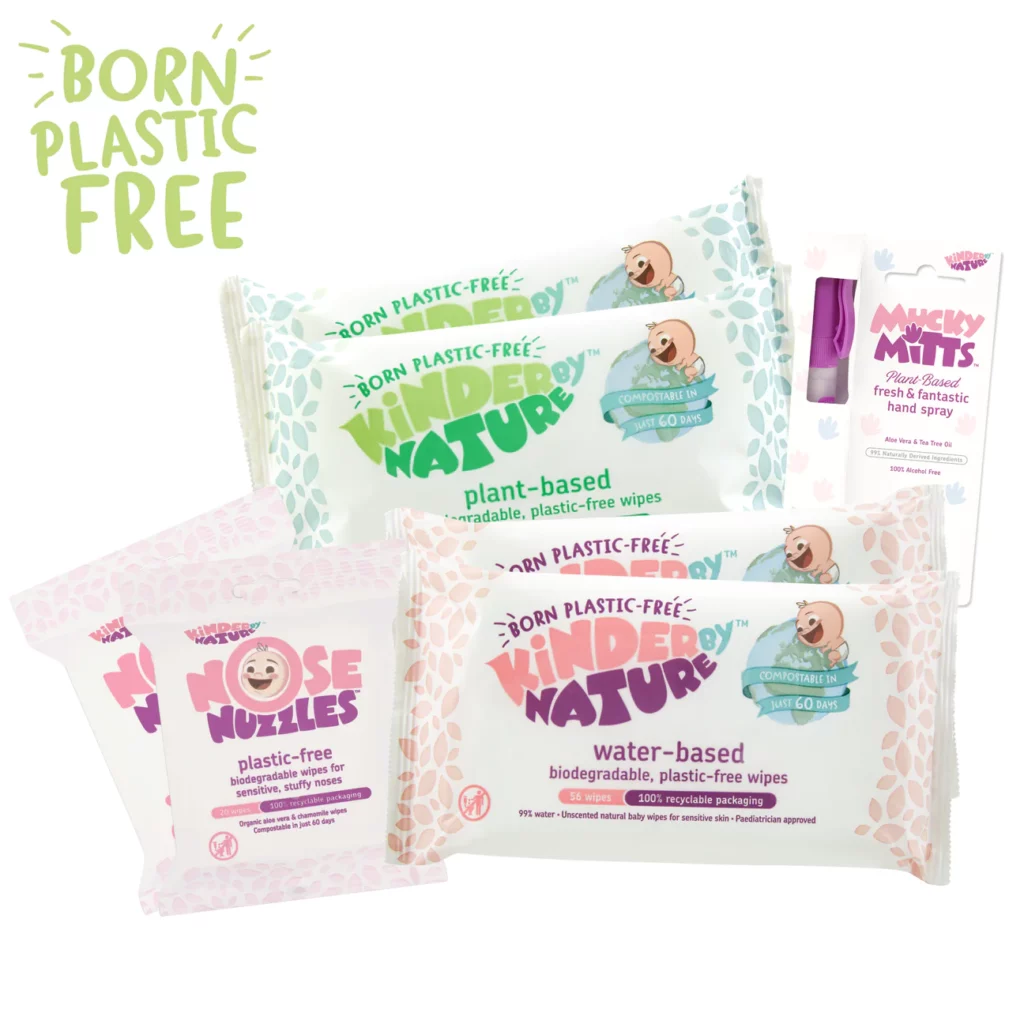
Types of wipes: Regular plant-based wipes and water-based wipes
Price range: £10 – £24
This UK-based company makes baby wipes that are made with minimal ingredients. Their regular plant-based wipes are mildly infused with chamomile and aloe vera to soothe inflamed or irritated skin. Their water wipes have even fewer ingredients—just wood pulp, water, and a few gentle cleansers and preservatives.
Just like the other natural baby wipes featured above, Kinder By Nature’s wipes are free from all harsh chemicals such as alcohol, parabens, lanolin, phthalates, or benzoates. They’re made in the UK, too!
Unfortunately, Kinder by Nature only ships to the UK & Ireland right now, but you can find them on Amazon or Walmart in the US and other countries.
What we like:
- Fragrance-free.
- Uses chlorine-free bleaching method (hydrogen peroxide).
- pH balanced, tested by dermatologists, and approved by pediatricians for quality.
- Affordable trial pack allows you to try out their products before buying a bunch of it.
What we don’t like:
- Hard to find in the U.S.
- Some might find them a bit too stretchy where they don’t adequately clean up the mess.
“Compostable” vs. “Biodegradable” Baby Wipes
Many eco-conscious parents will understandably look for natural baby wipes that are also compostable or biodegradable.
But it’s important to distinguish between the terms “biodegradable” and “compostable,” as these terms are often used interchangeably, but their meanings are quite different.
All compostable products are biodegradable, however not all biodegradable products are compostable.
Biodegradable materials break down into smaller elements, which may or may not be “natural” or “non-toxic.” For example, many bioplastics that are advertised as “biodegradable” may actually just break down into microplastics, which are not good. This process can vary dramatically in time, ranging from a few weeks to several years.
On the other hand, compostable materials not only biodegrade but do so in a specific time frame—usually around 90 days—and decompose into nutrient-rich compost, leaving no toxic residue behind. This transformation occurs under specific conditions, which include the right balance of heat, moisture, and oxygen. It’s important to remember that because landfills don’t have those proper conditions, almost nothing is able to compost in there.
Additionally, it’s worth noting that not all compostable materials are equal. Some may be “home compostable,” which means they can be composted in your backyard compost heap. However, other compostable products, including some types of baby wipes, can only be composted in industrial facilities. These facilities maintain optimal composting conditions that aren’t typically achievable in home composting setups, enabling faster and more complete decomposition.
Understanding the difference between “biodegradable,” “home compostable,” and “industrial compostable” is helpful in identifying (and not getting duped by) greenwashing.
Now, let’s address the question of whether you actually should compost dirty wipes. The answer largely depends on the type of composting process you’re using. Most home composting systems aren’t able to reach the high temperatures needed to kill harmful bacteria found in human waste, such as E. coli and salmonella. Therefore, composting dirty baby wipes at home could potentially introduce these harmful bacteria into your compost heap, making it unsafe to use.
Industrial composting facilities, however, often maintain the high temperatures necessary to break down these harmful bacteria, making it safer to compost wipes with human waste. Still, it’s vital to ensure that your local facility accepts such waste for composting, as not all do.
All that to say: looking for disposable baby wipes that are compostable is a good thing, but it also might be kind of irrelevant. Unless you have a proper compost set up in your yard in which you can safely dispose of human feces, or you have a relationship with an industrial composting facility that takes human waste, then your wipes are most likely going to end up in the landfill.
Which Type Do You Want? Wet Wipes vs. Dry Wipes vs. Reusable Wipes
Wet baby wipes, dry wipes, and reusable wipes each have their pros and cons.
Wet diaper wipes are more convenient because they already have everything you need to clean your baby’s skin—just pull one out of the package and you’re ready to go. But some parents may want an even more minimal ingredient list than even the most organic baby wipes can offer, which is where dry wipes can be a good option.
Dry disposable diaper wipes are usually only made from cloth. You use your own water/cleanser and then throw them out after use.
Then there are reusable baby wipes, which you use, wash, then reuse again. This is usually the most economical (and definitely less wasteful) option over the long term. Ideally, you’ll want to look for reusable cloth wipes made out of organic cotton and that are undyed. Esembly, Under the Nile, and Marlee’s Monsters are good options to check out.
Just make sure you’re using a safe, non-toxic baby cleanser to put on the wipes (I personally really like Healthybaby’s foaming wash) and that you’re using a non-toxic laundry detergent to clean them afterward.
Alternatively, you can make your own wipes out of an old organic t-shirt, towel, or wash cloth!

FAQs
What are the safest baby wipes to use?
The safest baby wipes usually have a minimal amount of ingredients. They are plastic-free and instead made from a plant-based fabric; they are whitened without chlorine (or completely unbleached); and they are free from things like skin irritants, harsh preservatives, formaldehyde releasers, and synthetic fragrances.
Which baby wipes are chemical free?
“Chemical-free” is a bit of a misnomer because technically everything is a chemical—even water. That being said, you’ll want to look for brands that are free from toxic chemicals, such as endocrine disruptors and skin irritants. Some of the best baby wipes that are toxic-chemical-free include Healthybaby, ATTITUDE, and Eco Pea Co. See above for even more options.
Are baby wipes non-toxic?
Some baby wipe brands contain sneaky ingredients, so they’re not necessarily all truly “non-toxic” for your little one. This is important because babies are even more vulnerable to things like endocrine disruptors than older people are. That being said, there are a number of brands that offer baby wipes made with safe, transparent, and minimal ingredients. See the list of non-toxic brands above.
What is a healthy alternative to baby wipes?
You can easily spare your baby exposure to potentially toxic chemicals and save money at the same time by using a reusable cotton cloth (ideally organic) as an alternative to traditional baby wipes. You can use wash cloths, cut-up towels, or even old t-shirts. Just add a little bit of water and a safe baby cleanser to the cloth, clean your baby, wash, and reuse!
Are WaterWipes non-toxic?
While WaterWipes do have very minimal ingredients (which is a good thing), they cannot be considered truly non-toxic. This is primarily because they use benzalkonium chloride for the preservative, which is not suitable for babies with eczema, asthma, or similar sensitivities. Although the concentration of benzalkonium chloride is likely very low, there are safer options available on the market. That being said, however, WaterWipes are still a better option than many other conventional baby wipes. So if you’re in a bind, WaterWipes are certainly not the worst option.
What are the most organic baby wipes?
The most organic baby wipes are made by Natracare, which is one of the only brands that carries disposable wet wipes made out of organic cotton. Healthybaby also carries dry wipes that are made out of 100% organic cotton.
Are baby wipes safe for premature and newborns?
Yes. Baby wipes are safe for newborns, but again, ensure they are non-toxic wipes that are fragrance-free and ideally have minimal ingredients.
Can you flush baby wipes?
Most baby wipes are not flushable and have the potential to cause damage to your plumbing. That said, there are a few brands that offer flush baby wipes. Just make sure to check the packaging to be sure.
This guide was all about the best natural baby wipes that are safe for your baby and will help prevent skin irritation.
To get non-toxic recommendations, environmental toxin news, and other exclusive content delivered to your inbox once a week, sign up for Filtered Fridays.
About the Authors

Beth Waweru is a health and wellness writer and a freelance writing trainer and coach. She’s a certified content marketer, an on-page SEO specialist, and an advanced copywriter with over 5 years of experience. She enjoys writing content and copy for brands and individuals in the moms’ wellness, holistic health, and fitness industries.
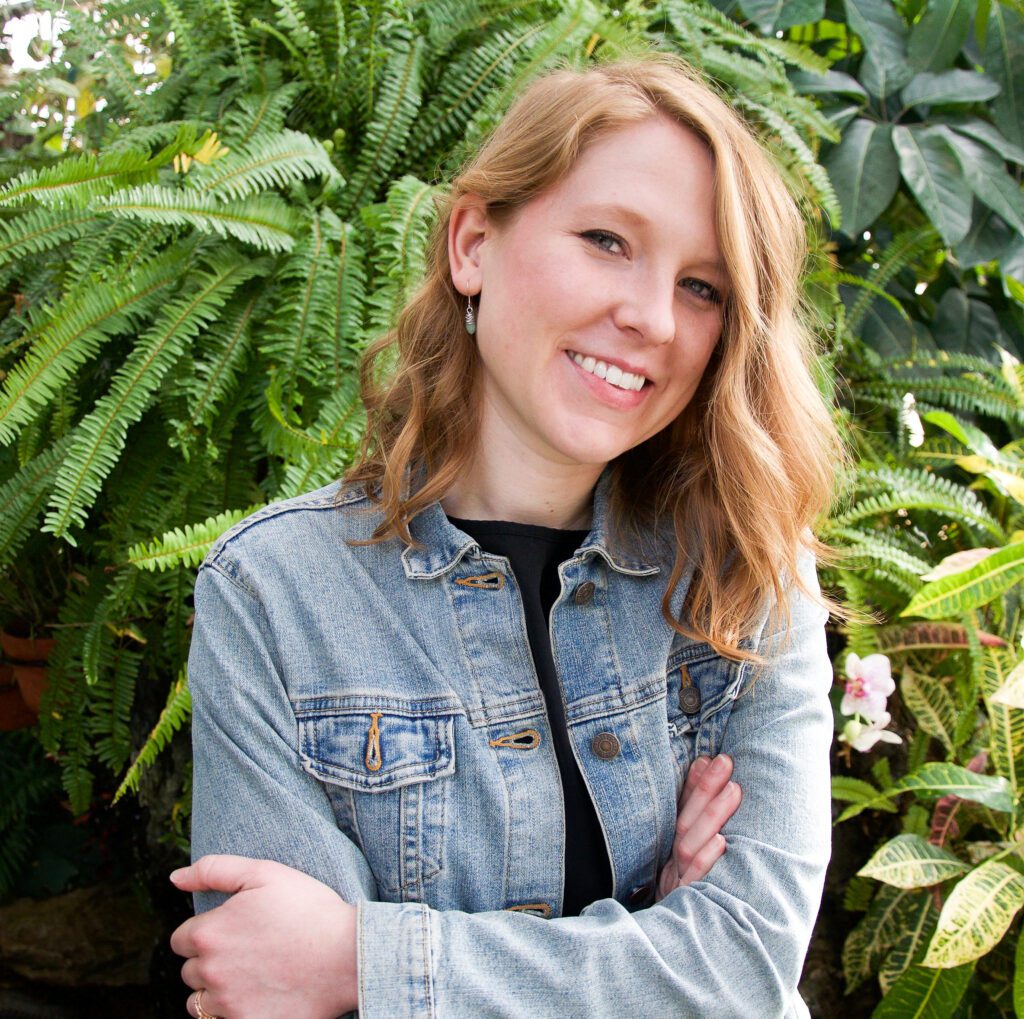
Abbie Davidson is the Creator & Editor of The Filtery. With over eight years of experience in sustainability, she researches and writes content with the aim of helping people minimize environmental toxins in an in-depth yet accessible way. You can find out more here.
